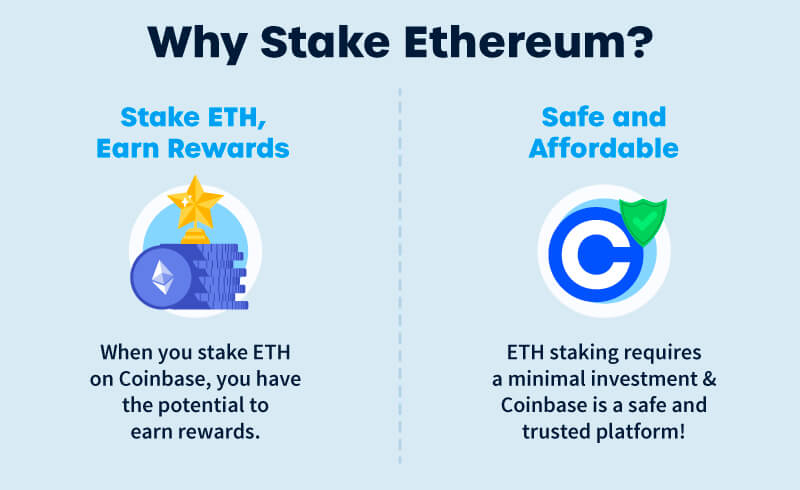

Key Takeaways:
- Coinbase is generally regarded as a safe place to stake your Ethereum.
- Staking enables passive income through rewards from your staking wallet.
- You don't need 32 ETH to stake on Coinbase. You can stake as little as 0.01 ETH at a time.
Staking Ethereum on Coinbase can give you rewards as income. In this article, we'll look at whether you should stake your Ethereum on Coinbase, how to do it, and what you can expect from your staking experience.

What is staking, and how does it work?
Staking involves holding cryptocurrency in a digital wallet to actively contribute to the operations and security of a blockchain network.
When you stake cryptocurrency, you securely lock it into a smart contract, and in return, you receive rewards for helping to validate network transactions.
Staking has gained significant popularity among cryptocurrency investors seeking passive income opportunities. Many cryptocurrency exchanges and wallets have introduced staking services to cater to this demand.
Pros and Cons of Staking Ethereum on Coinbase
If you're considering staking Ethereum (ETH) through Coinbase, it's crucial to grasp the intricacies of the process, the advantages, potential risks, and the prerequisites before embarking on your staking journey.
Pros:
- Affordable: You don’t need a lot of ETH to stake to make returns.
- Safe: Coinbase ensures your invested funds remain safe.
- Earn: Staking ETH allows you to earn while still holding onto your crypto
Cons:
- Taxes: Staking income is taxable, based on the current crypto taxes in the US.
- Control: While your crypto is staked, Coinbase has control over it.
How much Ethereum do you need to stake on Coinbase?
Whether your wallet holds 0.001 ETH or 1 ETH, you can stake your ETH on Coinbase and start earning rewards.
An Ethereum node requires 32 ETH to run, but luckily, you don't need to provide all 32 ETH to have a stake in the node. Coinbase ensures that enough ETH is provided to the node ETH with other people who are looking to stake their ETH via Coinbase.
Is it safe to stake Ethereum on Coinbase?
It’s important to recognize that staking crypto is an investment, and you could potentially lose your ETH while staking. Only invest money you can afford to lose in your staking ventures.
Staking Ethereum (ETH) has some risks you should be aware of. The first is known as "slashing," where the Ethereum network penalizes validators for certain mistakes. The good news is that Coinbase has robust measures in place to prevent slashing, and they might even refund some losses caused by it.
Another concern is the security of your Ethereum on Coinbase. While Coinbase takes security seriously, there's always a risk of a hack when you store your cryptocurrency in a centralized exchange.
When you stake ETH, you can't use it for other investments or transactions until you stop staking. However, Coinbase is one of the few exchanges that allow users to trade staked ETH (cbETH) — which means that you can still dispose of your holdings!
The rewards you earn from staking are considered taxable income, so be prepared to report them when tax season comes around. You might receive a 1099-MISC form from Coinbase for your staking income.
What are the benefits of staking ETH on Coinbase?
To begin with, staking offers users the opportunity to earn rewards by holding and verifying transactions on the Ethereum blockchain. Among the benefits that users get for staking include:
- Earnings: Staking is a good method of generating passive income for investors.
- User Friendliness: Coinbase's staking service stands out for its user-friendliness, featuring no setup or maintenance fees and a straightforward process for withdrawing funds.
- No Penalties for Early Unstaking: While staking involves temporarily locking up some ETH, Coinbase allows users to un-stake their assets without incurring any penalties.
- Safe: Staking with Coinbase is a safe option since, to date, no staker has lost coins through Coinbase. It's a relatively low-risk way to participate in and earn from the ETH network.
Are there any problems with staking ETH on Coinbase?
In June 2023, the SEC filed charges against Coinbase for their staking-as-a-service model. According to the SEC, Coinbase unlawfully operated as a broker-dealer, clearinghouse, and exchange despite not being registered with the SEC to offer any of those services.
While the SEC hasn’t banned Coinbase from offering its staking-as-a-service to users, it’s crucial for those in the US who are interested in staking to pay attention to this developing story. It is possible that staking may be limited or forbidden to US-based users if the SEC prevails over Coinbase in court.
Currently, Coinbase has restricted access to its staking-as-a-service in four states: California, New Jersey, South Carolina, and Wisconsin.
How much can you earn staking Ethereum?
Ethereum's current estimated reward rate is 3.27%. The rate of rewards changes daily, depending on how many people are staking. As of April 2023, 19.2 million ETH has been staked on the network.
Frequently asked questions
How we reviewed this article
All CoinLedger articles go through a rigorous review process before publication. Learn more about the CoinLedger Editorial Process.

CoinLedger has strict sourcing guidelines for our content. Our content is based on direct interviews with tax experts, guidance from tax agencies, and articles from reputable news outlets.






























%20(1).png)





.png)
















